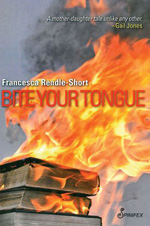

Spinifex Press, paperback, 9781876756963
Bite Your Tongue is part memoir, part fictionalised memories of Australian writer Francesca Rendle-Short, who is trying to make sense of a childhood lived in the overpowering shadow of her mother Angel. Angel was a Christian moral crusader, fighting to protect the children of Australia from being corrupted by 'sex saturated' books such as The Well of Loneliness by Radclyffe Hall and JD Salinger's Catcher in the Rye.
Rendle-Short writes, 'some stories are hard to tell, they bite back'. I can only imagine how hard this one was to write and publish. To make what must have been an extremely difficult process easier, Rendle-Short chooses to tell her story through the fictional character of Glory (surname Soldier. Her father is given the first name of 'Onward'). Glory's mother, MotherJoy, is on a mission to save the souls of Queensland's youth. She bombards teachers and public officials, including the Governor-General, with tirades against the filth being peddled through the school reading lists and even conducts book burnings. At home, she is a prickly, unpredictable character, never showing her children the love that she has for her holy mission. The story moves between Glory's childhood as she endures the daily humiliations that having such a mother brings, and adulthood and the death of MotherJoy. The most astonishing aspect of Glory, as a child and as a grown up, is that she never condemns MotherJoy's behaviour or beliefs and when older still seems to retain an affection of some kind for her mother.
The British writer Jeanette Winterson had a very similar childhood to Francesca Rendle-Short, with an evangelical mother who objected to literature. Winterson wrote a fictionalised account of her experiences (Oranges Are Not The Only Fruit) which she now believes is a 'cover version' of her early life, the story that she could live with. Bite Your Tongue is the story that Rendle-Short could live with, the story that she would like to have happened. Although there is no tirade against Angel and no hatred expressed, Rendle-Short's real memories (if any memories can be said to be real) that are interspersed between the chapters about Glory suggest that the author was much more negatively affected by Angel's behaviour than Glory is by MotherJoy. I think Bite Your Tongue is an attempt to achieve some kind of reconciliation, to understand why Angel was as she was and to come to terms with an unusual and difficult childhood.
I've come away from this book feeling quite sad. Sad that Angel had so much energy and passion that could have
been directed towards her family. Sad for Rendle-Short and Glory and their childhoods. Sad that some people see
literature as something to fight against. And sad that Rendle-Short is still struggling to make sense of her life.
